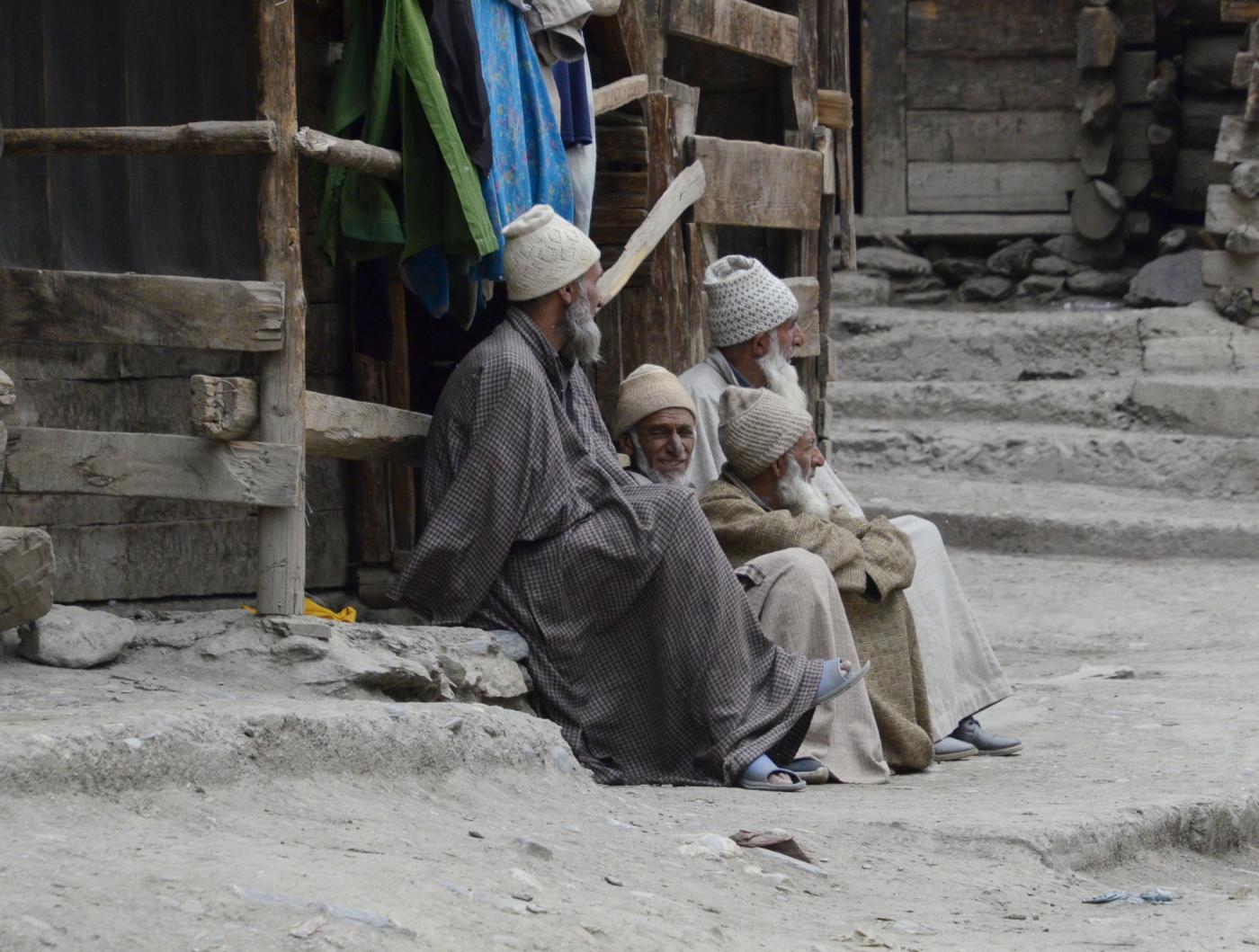Left Behind – Abandoned in the Valley The forgotten elders of Kashmir
By: Rakib Chatt
In the old age home, some elderly hold on to old letters, others whisper lullabies to the wind, and all of them wait – for a visit, a call, or even a simple touch that reminds them they are still loved.
One among them is Rafiq Ahmad (name changed) who once built a home, raised the children, and sacrificed everything for the love of his family. But now, in the final chapters of his life, he finds
himself alone in an old-age home, where the past feels more than the present.
Rafiq, a 75-years-old man abandoned by his three children, now is living a life of isolation in an old age home. “I crave for my family,” Rafiq said. For Rafiq, family is a place where love, joy, and the feeling of belongingness always exist. But now his family is no longer with him when he is aged. In a sorrowful voice, Rafiq said, “My children have a good source of income, yet they deprived me of basic necessities such as food and medicines.” “Nothing is more painful than to see that I struggled throughout my life for my kids, and the same kids one fine day asked me to leave once for all,” Rafiq said.
He said that it was the same house which he had built with pangs and toils. With tears rolling down, Rafiq said that when I was thrown out, I tried to cook food on my own, forget about delicacies, I repeatedly failed to even cook rice.
Remembering his wife, Rafiq said, “Thank God! My wife has died. She doesn’t have to see this day where I became a wanderer in search of home.” Rafiq was brought to an old age home by his neighbour and since then he is living in a room which he shares with two more elderly people who have also met the same fate.
According to the caretaker of that old age home, Rafiq keeps requesting them to help him to get back to his home despite the fact that none of his children come to see him. The old age homes in J&K are run by the NGOs which are sponsored under Atal Vayo Abhyuday Yojana (AVYAY) scheme, which is a scheme of the Government of India for elderly people.
Under the AVYAY scheme old-age homes are constructed. This scheme helps provide food, shelter, medical care, and entertainment for senior citizens. According to Manzoor Ahmad, who looks after one of the old age homes in Srinagar, an old-age home is just like a hostel where those who are abandoned by their kids are taken proper care of just like the way they want.
Manzoor works in an old-age home run by a New Delhi based NGO ‘HOPE’ which is located in Bagh- e-Mehtab area on the outskirts of Srinagar. Manzoor shared a case where an old man was abandoned by his children. “The old man was from a well off family, and his son and daughter were doctors,” he said. “The irony was that even after his death, the family didn't bother to collect his body. It was after the intervention of district administration, his children took his body for the last rites.”
Amir Muhammad Wani, a PhD scholar in the Department of Sociology, University of Kashmir, who is currently researching on how old age is perceived in a Kashmiri society. He said that with the breakdown of the joint family system, the autonomy and authority of elderly people perished. “Modernisation and nuclearisation of families changed the role of elderly members from being a
source of wisdom to redundant members,” Amir said. “There is stigmatisation of elderly people in Kashmir as people neglect them and call them Mond (useless crap).”
In his research, he found that loneliness was the biggest problem that the elderly people face and the worst part was that people do not want to talk to them. “The other issue faced by aged people is that in their family they are verbally abused and even at times confined to a single room,” Amir said. “Old age homes have a big role to play in Kashmir, as in nuclear families both husband and wife are earning. So, during the day, the elderly have to stay alone. There is no one to look after them and here comes the old-age home in the picture.” He has found that compared to other parts of Kashmir, elderly are mostly disregarded in Srinagar City.
Amir said, “In urban areas elderly people are worse off than in rural areas due to the fact that in rural areas the traditional agency of the village neighbourhood is still intact. This means that in the
evenings, the elderly people of the village sit together and share things with each other while in the city there is no such mechanism where elderly people can sit and talk tighter.”
Dr Arshad Hussain, a senior psychiatrist at the Institute of Mental Health and Neurosciences (IMHANS), said that when an elderly person is ditched by kids, it is a kind of trauma for them and the
trauma usually takes time to recover, but in old-age the recovery power is minimal.
Dr Arshad said that the reality was that old people live alone and there was a need to create a supporting infrastructure for them which would keep them engaged. He stressed that the public infrastructure including those for recreational places should be made accessible to elderly people. A senior official of the Social Welfare Department on the condition of anonymity said, “When all
doors for elderly people are closed, the government takes care of them. Old-age homes have become a need of the time. Those who don't have kids have no other option than an old-age home
but those who have kids must live with their children.”
The old people only seek two things, care and protection and that too through their progeny and that is their sole demand. There is a law in Jammu and Kashmir regarding the elderly people – The Jammu and Kashmir Maintenance and Welfare of Parents and Senior Citizens Act, 2014. This provides for the maintenance and welfare of senior citizens and parents.
As per the law, every district has an old age tribunal, whose presiding officer is Additional District Magistrate (ADM). ADM Srinagar, Khalid Hussain Malik said, “In the last one year four such cases have emerged in front of the tribunal of which two have been resolved.”
Recently, the tribunal has received an application where parents are pleading that they are ignored and do not have any source for survival. Their children have taken away property worth crores of rupees and their condition is reduced where they don’t have money to buy food and medicines. This is despite the fact that the couple has three children and all are working in government services,
including a gazetted officer.
“We try to resolve such conflicts through arbitration. It’s seen that blood relations are the strongest and therefore the aim of the tribunal is to facilitate reconciliation between the parents and the
progeny,” Malik said. He said that the problems faced in old-age are due to the fault of parents as they have neglected the upbringing of their children.
Sharing one such incident, Malik said, “One of the parents cried in front of the tribunal yelling out that he failed to look after his child when he was young. He had never inquired why his child
returned home late or even bothered to ask why the child came home inebriated.”
He said that the relations are sensitive and no law could force reconciliation. “So, there is dire need to build the society on a moral basis as the society is very receptive,” Malik said.
In Kashmir, where traditions of care and kinship run deep, this silent reality is unfolding. This realtiy is of elderly struggles and fading family bonds. Under the garb of modernisation there is a decline of moral and ethical values which should look into in the larger interest of the society.
A Call to Action
The plight of Kashmir’s elders is a reminder of the importance of intergenerational bonds. It is crucial for society to recognize their contributions and ensure they are not left behind.
- Family Responsibility: Families must prioritize regular visits and communication with elders, even from afar.
- Cultural Preservation: Schools and community centers can involve elders in teaching traditional crafts and storytelling.
- Policy Advocacy: Stronger policies are needed to address healthcare, financial security, and social inclusion for the elderly.
Rakib Chatt
m.rakibahmed@gmail.com



